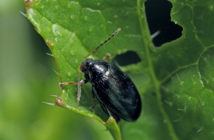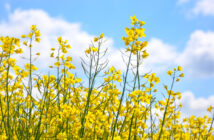Spring crops could be on the rise this year, after dry autumn conditions saw many farmers fail to establish their winter oilseed rape crop. With growers looking at their options, is it time to give more attention to spring oilseed rape as a viable option?
Last year, spring oilseed rape was the most financially attractive of the spring crops, and since then the price has improved further. Though it is one of the more challenging spring crops to establish, it has been suggested that with the right strategies in place, it could prove to be an attractive option for growers this year.
“I think this is a year spring oilseed rape can really stack up,” says David Bouch, Seeds Manager at Hutchinsons, “We’ve seen an autumn where an awful lot of winter oilseed rape struggled due to lack of moisture or pest damage. That means there’s a real opportunity for spring oilseed rape: in the current market climate, and with the rotational benefits it offers, it deserves careful consideration.
“You’ve just got to have the confidence that you’ll be able to establish the crop well, so the key is to think about and confront the potential issues early, and make sure you employ the best possible approach when it comes to establishment.”
Here are some tips to help growers establish and make a success of spring oilseed rape this year:
1. Drill at the right time – as spring oilseed rape can struggle in cold or dry conditions, growers should resist the temptation to drill too early. Outside of the south west, a drilling date of late March or early April is best; any later and growers risk incurring yield penalties.
2. Look for vigour – vigour plays a key role in ensuring the crop is competitive enough to cope with pest and weed pressures. Hybrids such as Builder and Dodger get up and away quickly and provide a greater resilience to tough conditions later on.
3. Put the seed to bed – spring oilseed rape needs a warm, moist seedbed, which means avoiding overworking the seedbed. The seed should then be drilled to a depth of between 1.5cm and 2.5cm.
4. Oil content boosts returns – varieties with high oil content can help growers take advantage of the premiums, with bonuses of up to £26.52 on offer. Top of the AHDB Descriptive List is Builder, which also has one of the highest oil contents (45.2%).
5. Get ahead of the game with herbicides – pre-emergence herbicides are much more effective than post-emergence treatment in spring oilseed rape, so growers should try and delay drilling until they have conditions that allow for herbicides such as a metazachlor and clomazone mixture to be applied.
6. Two doses of nitrogen – for most spring oilseed rape crops, two nitrogen doses of between 100kg/h and 150kg/h work best, and these should be split, with the first application at sowing time and the second application at emergence.
7. Beetles are a threat – though spring oilseed rape does not suffer as much at the hands of diseases such as Phoma and light leaf spot, pests such as cabbage flea beetle and pollen beetle can still cause serious damage. The beetles can appear with little warning, so growers should be prepared to apply insecticides when necessary.
8. Great to meet wheat – spring oilseed rape is an excellent entry for first wheats, as it improves the soil structure and leaves behind residual nutrition. Pulses provide similar benefits, but are not enjoying as high a commodity price.
“Spring oilseed rape is becoming a more attractive option in the UK this year due to increased commodity prices,” says Sarah Middleton, Seed Campaign Manager at Bayer, “So growers need to ensure they pick the right variety if they want to take full advantage of this opportunity.
“The varieties Builder and Dodger are top of the Descriptive List, with gross outputs of 107% and 106% respectively. They both have high oil content and excellent early vigour, and they’re quite early maturing as well, which is beneficial for time management.”
Mr Bouch concludes: “Spring oilseed rape is a useful rotational tool, it’s a useful management tool, and most importantly it can make you money. Crop establishment is key, so you have to be looking at hybrid vigour, moist soils and a firm seed bed. People will obviously consider all the options, but spring oilseed rape should certainly be in the discussion.”



